#navi talks
Text
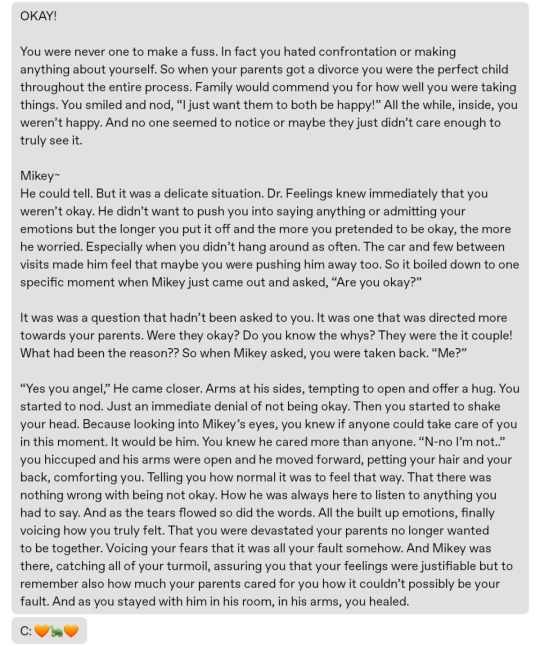
So, @tmntxthings wrote me this because I have been having a tough time lately, and I was in need of some turtle-comfort, and I love it. 💕
Thank you again, sweet Grace, I really appreciate it. 🫶
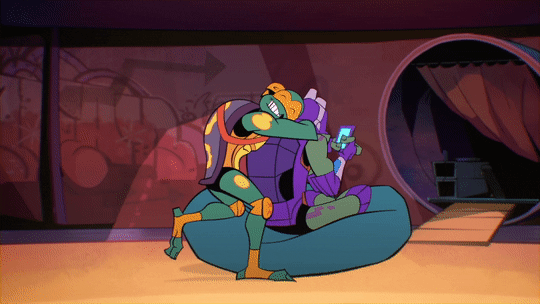
#love you grace#you were my Dr Feelings today <3#little comfort story#navi talks#rottmnt oneshot#mikey oneshot#mikey x reader#rottmnt#tmnt fandom#oneshot#rise michelangelo#rise mikey#rise of the tmnt
59 notes
·
View notes
Text
Everyone should eat couscous till the point of almost exploding at least once in their lives methinks….
7 notes
·
View notes
Text
TELL ME THIS NEW UI IS A JOKE TUMBLR OR I'M FULLY (REGRETFULLY) CRAWLING BACK TO REDDIT AS MY ONLY PLATFORM I CAN'T DO THIS ANYMORE NONE OF THESE SITES R LISTENING TO US
#navi talks#i'm so tired#listen if they're actually serious and don't revert this#i'm not gonna bother anymore#and if reddit falls further down the shithole i will also permanently leave#i will become a hermit#better for my mental health yes yes#all i'll read are my org's news articles like i'm too old for this shit#goodbye beautiful communities it was nice while it lasted#argh maybe instead of making games i'll jump into software dev and make my own damn socmed (not srs i don't have what it takes)
1 note
·
View note
Text
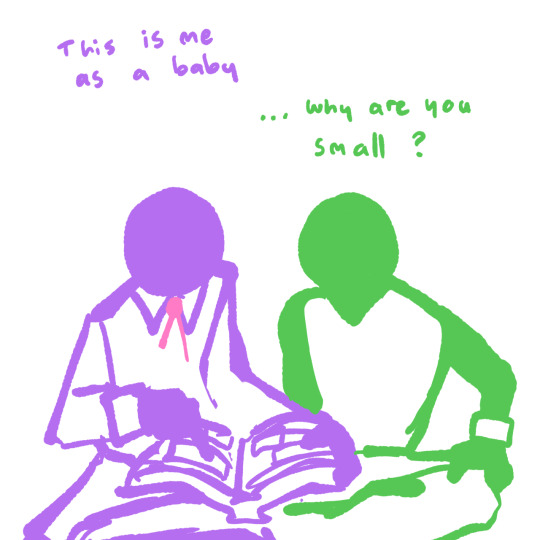

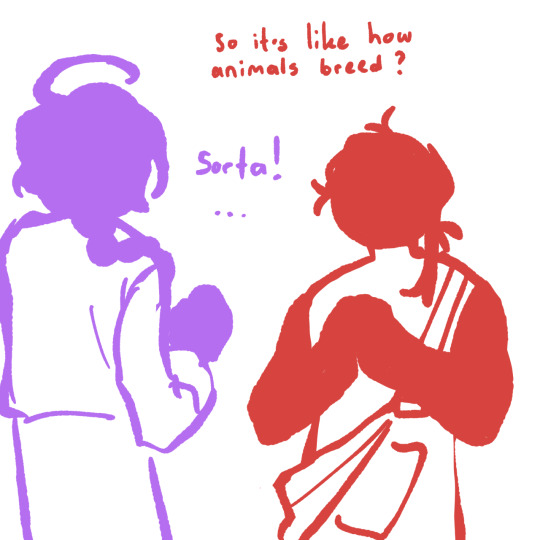
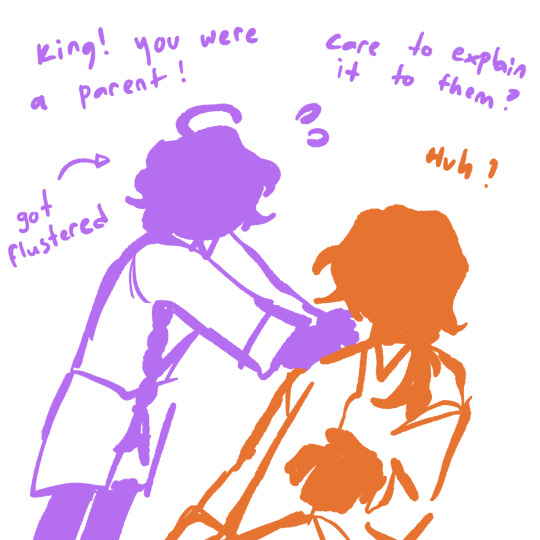

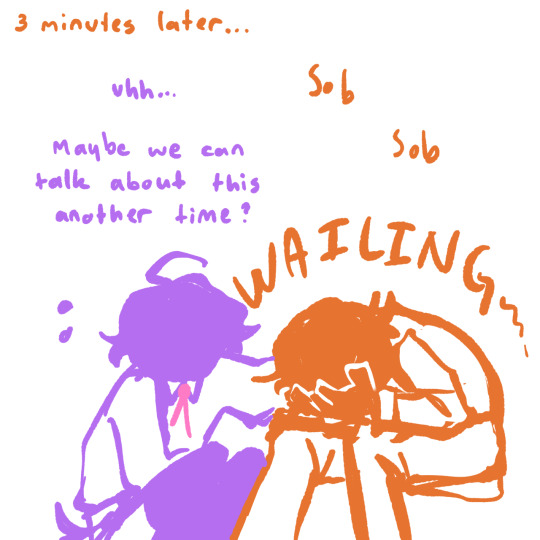
What the hell is sex
#navy arts#animation vs animator#animation vs minecraft#avm purple#avm king orange#ava red#ava green#he started talking abt gold n got really really sad
753 notes
·
View notes
Text

Won the war, got the independence, became president. Now what
#look man i can't draw him happy thrice in a row that's just above my capacity#today is independence day proper so i wanted to draw smth too#to the one person one year ago that sent me the one napoleon painting that had this pose thanksies#don't talk to me about the abstract background i canf be bothered to do anything presentable#and before anyone gives me shit for it I AM AWARE napoleonic uniforms are a lighter blue i know. i like him better in navy#i hope you enjoy <3 alright bye-bye xoxo#fennec. art#my art#cwilbur#dsmp fanart
574 notes
·
View notes
Text
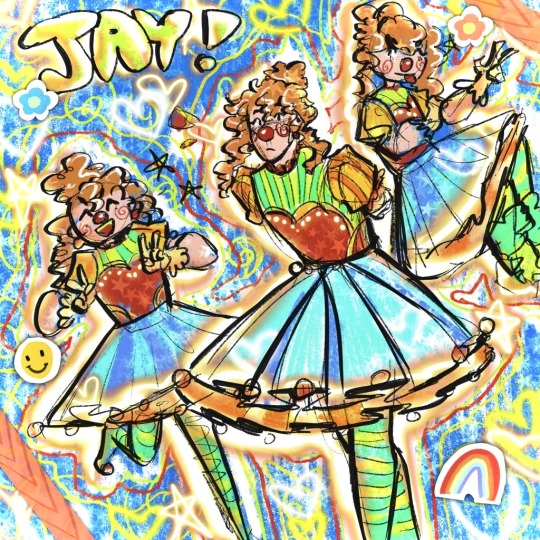
jay went to clown school. let’s talk about that
#art by me#jrwi riptide#jay ferin#i was drawing wherever the wind took me#and it took me to clown school jay#the best destination i could’ve hoped for#i feel like so much could be explored or expanded there in fanon#but i barely see anything#welp if there is none make some#sound off in the comments if you ever think about how jay rarely retracts into herself when faced with conflict#but instead goes to clown school or hitches a ride with the loserest boy she can find#and it’s the rare (and most impactful) moments when she responds differently#shutting down after the phone call with her grandmother#or blowing up after learning about lizzie and ava#or crying as she’s told to shoot her friend in the chest#but the every day conflict almost always gets humor as a response#which leads to very out of pocket moments but we love jay for it#oooooough jay ferin the way you express emotions is so important to meeeee#ALSO the fact that often it’s insult based humor or overly confident in self humor#let’s dissect that jay how do you relate to your friends in the hierarchical structure of the navy academy#did you feel like your humor had to subtly place you at the top? or you would not be enough? jay?#your relationship with kira hinges on fixing this structure by being better than it hm? let’s talk about that#let’s talk about how your life centered a lot around being the best even if not directly or intentionally#should i do a full analysis on this?#i kinda wanna do a full analysis on this
142 notes
·
View notes
Text
So something has been bugging me for a while now about A and N’s backstories, and while I know not everyone will be as pedantic as me, as someone who loves history and has done a lot of writing, I feel that if you’re going to write a story about vampires and give them a specific time and date of origin, then there should be a certain level of research that goes into making that background authentic. I'm not saying that Mishka didn’t do any research. It just seems that in order to keep the vibe of a happy, mellow fantasy some of the less savoury aspects of A and N’s upbringings have been left out, and it's a shame. To be honest, it feels a bit disingenuous, and it feels like an opportunity got wasted.
Let me explain (long post got long, it's 2am)
Let's take A first, since the problem is simpler here.
A is the child of a Norman lord and an Anglo-Saxon noblewoman, born in the first generation after the Norman Conquest of England in 1066. A says that these were turbulent times but that their parents had a happy marriage. Which. While I’m sure a lot of unions in that time period made the best of it, I can’t help but feel this description strips away a lot of the context of what was going on at that point in history - and removes some of the complexity about A’s thoughts on love and relationships.
Basically, after he took control of the throne, William the Conqueror stripped many Anglo-Saxon lords of their lands and titles so he could give them to his Norman buddies instead - with the added bonus that it left the Anglo-Saxons without the means to raise armies against him. The sisters, daughters, and widows of the dispossessed Anglo-Saxons were then forced to marry these new Norman lords to legitimise their power, not infrequently after all of their male relatives had been slaughtered. It’s not as if Anglo-Saxon women weren’t used to being used as political chess pieces, but the years after the conquest were brutal. It’s why William had to build so many castles. The point that I’m trying to make is that even if A’s mother was content enough in her daily life, due to the power imbalance between her and her husband, it's very likely she had little choice in the matter. She may have seen a lot of her family killed for political reasons, with the knowledge that – in an age where women had very little protection outside of their paternal household – she might be next if she made too much of a fuss.
It would be fascinating to see what effect that tension has had on A 900 years later, or even to get an acknowledgement of how much times have changed, but we don’t. We don't see how their early years affected them, how they view relationships formed naturally instead of via political contracts. And I really, really wish we did. There is so much potential there.
But A is not the one keeping me up past 2 in the morning. It’s N, and the utter detachment their backstory seems to have from the period in history they lived in as a human. And it all stems from the fact that they came from the English nobility in the late 1600s.
See, the bulk of the problem is that English inheritance law at the time heavily favoured primogeniture, where a man’s wealth would go to his first-born son. Some dispensation was made for widows and other children, but the estates, assets, and most of the money had a very clear destination.
For one thing, this makes it kinda weird that N’s stepfather would have needed an heir before he could inherit, because except in extreme circumstances everything would have gone to him anyway. Don't get me wrong, this isn't the worst part of the problem, it’s just annoying when there are more plausible reasons for him marrying a woman already pregnant with another man’s child (old family friend wanting to save her from disgrace, needed the dowry to pay off gambling debts, there was a longstanding betrothal between them that would have been tricky to get out of, etc.).
No, the bigger problem with N’s backstory vs primogeniture is firstly that at the time the English aristocracy was racist af (still is tbh) and given his pretty obvious mixed-race heritage, no court would have agreed that Nate was a legitimate son (this is for a very special reason that we will be coming back to). I say Nate specifically here because primogeniture requires the eldest legitimate son. Nat wouldn’t have inherited at all, as women in that period passed from the guardianship of their father (or other male blood relative) into that of their husband after marriage, and only gained any kind of independence with widowhood. If N had been an only child, maybe they would have been treated as a special case, but unfortunately Milton exists: the eldest legitimate son who by law will inherit everything.
Now here’s the thing. Your average aristocrat in the 17th century is very obsessed with lineage and keeping the family line unbroken. He would not, therefore, send his legitimate heir to sea to be shot at or drowned before he can carry on the family name – that joy instead goes to any other sons who need their own profession, because again, they will get very little. Nat would have had a dowry, but would never have been expected to make her own living, so I'm going to focuson Nate for this next bit.
In Book 3, if you unlock his tragic backstory Nate tells you he joined the Royal Navy after Milton went missing so that he could go look for him. And, well. This is where his backstory as Mishka tells it completely falls apart. For two reasons:
1. Even in the modern day, you can’t ‘just’ join the Navy, and you certainly can’t just jump straight to being a lieutenant – it takes years of training and after a certain age they won’t take you because they won’t be able to mould you easily enough into a useful tool. For most of the Navy's history, the process was even more involved. It wasn’t an office job you could just rock up to and then quit if you felt like it, it was a lifetime commitment. Boys destined to be officers would be sent to sea as early as 12 to learn shipboard life, starting at the bottom and moving up the ranks. These were gained by passing exams and by purchasing a commission – which is why you generally had to come from wealth to be an officer at all. Once you get to lieutenant you're responsible for a lot of people, and might be tasked with commanding any captured ships alongside the daily running of yours - it was not an easy job.
2. Even as a lieutenant (one rank below Captain, with varying levels of seniority) it’s not like you can just go where you want. In the 1720s British colonies already existed in India, the Caribbean, and up the entire eastern seaboard of North America and into Canada, and the Navy was tasked with protecting merchant shipping along these seaways (and one trade in particular that we’ll be getting to, don’t worry). Nate could have ended up practically anywhere in the burgeoning empire. He would not have been able to choose whom he served under, and would not have been able to demand his superior officer go against orders from the admirality to chase down one lone vessel because he thinks another one of the admirals might be a bit dodgy. It could not have happened.
Besides these impracticalities, there’s a far easier way for the child of a wealthy man to get to a specific point on the far side of the globe to look for their lost sibling, which is the route I assume Nat took sine she couldn’t have joined the Navy (yes she could have snuck in but she’s specifically in a dress in the B2 mirror scene so). All they'd have to do would be to charter a ship and tell the captain where to go, which is the plot of Treasure Island. It's quicker, less fuss, with less chance of things going wrong. It's even possible in the age of mercantilism that the Sewells had some merchant vessels among their holdings that could be diverted for the task. Why go through the hassle of joining the Navy and potentially ending up on the wrong side of the world when you can just hire a ship directly?
If Nate does have to be in the Navy (and let’s face it, it’s worth it just for the uniform) then it's far more plausible is that, as the illegitimate son who would not inherit because of racism etc, he got sent to the Navy as a boy and rose through the ranks to become a lieutenant. When he got news of Milton’s disappearance not far from where he was stationed, he begged his captain to go investigate in case whatever happened turned out to be the symptom of a bigger problem. Like pirates.
I like this version better not just because it makes more sense, or because it keeps Nate’s situation re: inheritance closer to Nat’s and therefore makes their stories more equal, but also because it adds a delicious amount of guilt to Nate’s need to find his brother. We know his entire crew died looking for answers, because he was selfish – that’s roughly 100-400 lives lost because of him, and we know that sort of thing eats at him.
So that's one side of the story, but if Milton wasn’t in the Navy, what was he doing on the other side of the Atlantic in the first place? Well, this is where we come to the biggest elephant in the room regarding N’s backstory as a member of the 17th century English aristocracy and potentially as a naval officer: the Atlantic Slave Trade. If you are wealthy in 17th century Britain it's more than likely that your wealth comes either from the trade itself, or from the products made with the labour of enslaved people. If you are wealthy, you want to protect your assets from attack by pirates or foreign powers so you don't become less wealthy, and that is what the Navy is for.
Regardless of N’s own views on slavery at the time – and any subsequent changes in opinion – it’s likely their family owned or had shares in slave plantations in the Americas. As distasteful as it is, it makes far more sense that Milton was on a trip to check the family’s holdings when his ship - specifically a merchant vessel - went missing. From a pirate perspective, a merchant ship would make a much better target than a Navy vessel, being slower, more likely to have valuable cargo, and less likely to have marines or a well-trained broadside.
It's not surprising that Mishka left out the subject of the slave trade given her tendency to skirt around darker subjects and general blindspot for racial politics, but it is nuance that, if it was there, would create a more grounded and coherent backstory for N that doesn’t have quite so many holes. Like with A being the child of an invader and his war bride, we could get some deeper thoughts from N about their place in the world - How do they feel to have grown up so privileged when others who looked like them were regarded as literal property? How did they feel being part of the system that made it happen? Did it inform their compassionate nature? Is it still a source of guilt or someithng they've tried to make up for?
I'm not sure where I was going with all of this. It's late, my sleep pattern is fucked. The tl;dr is that giving the vampires' backstories historical context would make them feel more multifaceted and would give opportunities for character growth that are instead missed because of a desire for a more sanitized version of the past.
#thank you for coming to my ted talk#the wayhaven chronicles#twc#a du mortain#adam du mortain#ava du mortain#n sewell#nate sewell#nat sewell#it's annoying because it’s such a small tweak in the grand scheme of things#If she didn’t want unfortunate implications she could have made N from a century later when the navy was actively trying to stop slavery#A could have been from a 50 years earlier to tie his whole family’s demise into the subjugation of the english after the battle of hastings#or a century later when the two courts had mostly integrated#mishka made choices#they deserve to be given more substance than mere aesthetics#you can tell it’s late I’m using long words
195 notes
·
View notes
Note
For the requests/open inbox, this may not be the lane you're looking for, but you made a throw a way mention in a response to the ask about Ice's enforcement of DADT that Bradley and Ice probably got into it at one point about Ice being totally okay with DADT as a policy (which I love your read on Ice being like, 'yeah, nobody should ask and nobody should tell. what's the problem here?') I would love to see that argument go down. Or honestly, just any Ice and Bradley interaction after the reconciliation that suits your fancy. I find that dynamic in your world super interesting. Bradley sees him as a father, Ice sees him as the person whose father I killed. I love the drama.
Five times Ice was so obviously Rooster’s dad + one time he explicitly wasn’t.
[Carole. 1994.]
He’s such a nervous man. Usually that’s not the word people associate with him. Nervous? Never! But he is. Carole Bradshaw’s more a religious woman than a spiritual one. She’s never put any stock into “chockras” or “ouras” or whatever the other girls her age were fooling around with in the late sixties and early seventies. But she does believe that you can understand a person just by looking at him or her, and when she looks at Tom Kazansky, she sees a little anxious creature, shivering in the cold, like one of those tiny spindly dogs who always needs a sweater. Maybe it’s her southern maternal instincts, something primal and animalistic inside her, I need to take care of you—and when he nudges her with a nervous shivering shoulder and whispers, “Can I bum a smoke?” —she reaches down to take his hand and says, “I only have one left. We’ll have to share.”
She knows she makes him nervous. His ears are red, and so’s the back of his neck. It’s early on a Saturday morning, and the church is crowded, and he’s self-conscious about the fact that she’s holding his hand. Good. It’s so rare she gets to make a man nervous anymore. She waves to Bradley, proud in his little striped button-down and his little blue bow-tie, where he’s lined-up with all the other aspiring pianists against the stage along the far wall, under the bare postmodern crucifix. The recital isn’t going to start for another five, ten minutes, and it’s organized by age, so Bradley’s somewhere in the middle. If Tom Kazansky needs a smoke, Carole Bradshaw will bum him a smoke.
They exit out the side door, and the low murmuring of the other proud parents in the church fades to the quiet of the alley. Birds chirping nearby. The sound of a latecoming car on gravel somewhere far away. Her cigarette and the flick of his lighter, her eyes on his mouth and his puff of smoke—it’s lit. He takes a drag, closes his eyes, then passes it to her. “Sorry to make you share,” she says, and she’s watching the red flush creep up the side of his throat with a silent pleasure. When she takes her own pull, she looks down to see that the filter’s gone the sweet red-pink of her old lipstick. Kind of like a kiss, sharing a cigarette.
“That’s okay,” he says. Nervous spindly little dog. “Uh, what’s he playing?”
“Beethoven. ‘Für Elise.’” Then, before he can think to judge, she goes on quickly: “It’s more complicated than you’d think. Goes up and down and all over the place.”
“It’s a good song,” Tom Kazansky says, “though I don’t know too much about piano.” He pauses. “I’m learning a little German, though. I think it’s E-leez-ah. She must’ve been an alright girl if Beethoven wrote a song for her.”
Carole Bradshaw doesn’t know what to say to that. So she says this instead: “Thank you for coming. It made Bradley—well, over the moon, I guess.”
Tom Kazansky smiles shyly. “Sorry Maverick couldn’t come. I know he wanted to.”
Of course he brings up Pete Mitchell. Drags her back into reality. “He’s in Washington again, isn’t he?”
“Correct.” He reaches out for the cigarette; she gives it to him. “TOPGUN’s biggest advocate. I keep telling him he should go into politics. I just talked to him yesterday—he told me he went to the Natural History Smithsonian on Wednesday—he bought Bradley a dinosaur picture book, I think. Does Bradley like dinosaurs?”
Carole Bradshaw shrugs. What nine-year-old boy doesn’t like dinosaurs, but… “He’s more into sea life these days. Whales, sharks, fish.”
“Some fish used to be dinosaurs, they think,” says Tom Kazansky, clearly just trying to fill the silence. Ears red, lips red. Smoke out of his mouth like a fire-breathing dragon.
Carole Bradshaw doesn’t know how much dinosaur history she actually believes. So she says, “It’s still really nice of you to come. You know, Bradley—Bradley thinks of you and Maverick as his—well, his fathers, I s’pose. So it’s nice for you to be here.”
She watches his reaction—just nervousness. Straight anxiety. He doesn’t meet her eyes, like she’s just kicked him in the ribs. He does not want to be Bradley’s father.
She says, “You don’t have to sign any papers, Tom. You don’t have to put a kid seat in your car. I’m just saying. Don’t worry about it.”
He says, “I can hear the kids starting inside—we should probably go back in.”
So Carole Bradshaw drops the cigarette butt to the ground and steps on it with the bottom of her flat. They go inside, and wait for a kindergartener to finish an overly simple “Canon in D” to take their seats again. She takes his hand. He lets her. After another half-hour, Bradley sits down on the bench in front of the hand-me-down Steinway and busts out “Für Elise” without a single missed note. It still shocks her, sometimes, to watch him play—it still shocks her, sometimes, that she is the mother of all that talent. And now maybe Tom Kazansky is the father of all that talent. How did that happen?
At the end of the recital, Tom Kazansky lets go of her hand. She knew he would. Knew his fatherhood is only temporary. But he lets go of her hand to accept Bradley’s great-big hug in the parking lot: “Gosling, that was so good.” Bradley’s proud smile is missing a few teeth. It makes Tom Kazansky laugh.
And after he drops them off at home, and peels away with a wave and a smile, Carole Bradshaw lights another cigarette from the half-full pack she’d brought with her to the recital and brings Bradley out to the backyard so he can play and she can watch him. But before she lets him go, she looks down at him and says flatly, “If kids at school ask you about Uncle Tom and Uncle Pete—you need to tell them they’re just friends.”
And in his eyes, she can see the confusion of a little boy who hadn’t been aware that Tom Kazansky and Pete Mitchell were anything other than just friends—the confusion of a little boy learning about duplicity for the first time in his life.
“Okay,” he says, so she lets him go.
—
[Maverick. 1998.]
“Don’t go easy on him,” Maverick hollers breathlessly over his shoulder, fishing around in the ice chest in the sand for two cans of Coors; “He just joined the J.R.O.T.C.; don’t go easy on him; he’s tougher than all your squadrons combined; beat him into the dirt…”
“Thanks, Uncle Mav,” shouts Bradley from across the volleyball court, where he’s getting initiated into one of the volleyball teams of younger fighter pilots.
Maverick flashes him a thumbs-up and finds his T-shirt on the first bleacher bench, pulls it on with one hand, and then hops up the rest of the benches to sit with Ice, who’s got his CVN-65 ballcap on and a book open in his lap and is offering informal career advice to one of the other lieutenants: “Yeah, so, in my opinion, it’s all down to what you think you can stomach… If you want me to look over your C.V., I can totally do that—I think I’m free Monday at around thirteen-hundred, if you want to stop in to talk. Not a problem. Not a problem. Alright. See you later.” He watches the lieutenant go, then lolls his head over to look at Maverick, who’s tossing an ice-cold can of Coors up and down. “Hey. Good game. —Coors, Mav? This is an insult.” But he takes the offered can anyway, looking out onto the court, where Bradley—fourteen and just entering his beanpole phase of evolution—is currently spiking the ball. “Cool.” It’s a nice summer Saturday, a casual opportunity for the officers of Miramar to socialize with their families (Ice is wearing a golf shirt and jeans), and by now pretty much everyone knows that Maverick Mitchell’s raising his friend’s kid and that he and Captain Kazansky are good friends, so this is pretty nice. Not much to hide.
“C’mon,” Maverick says, popping open his own can, ���you and I were having a scintillating conversation, a few minutes ago.” He’s hunting around for the sunscreen so the tops of his feet don’t burn to ashes in the sun.
“Scintillating. That’s a big word for you. Wow.”
“You’re rubbing off on me, Sir Reads-a-lot—”
“See, that’s funny,” Ice interjects, “because I seem to recall, before you so-rudely interrupted me to go play volleyball with the kids, I was telling you that it’s really not that interesting. It’s actually, Maverick, quite boring.”
“Well, I’m intrigued now. Go on. Finish it off, I wanna know.”
Ice slaps his book shut and gives the long tired sigh of a man who is very self-conscious about the fact that he’s about to turn forty. He pops the tab on his can of Coors and huffs in exasperation when it foams all over his hand. “I mean it, my family history’s really not that interesting. Typical eastern-European immigrant shitshow. U.S. officials change one letter in our last name and everyone loses their goddamn minds… Actually, that story might be apocryphal, I keep forgetting which former Soviet Socialist Republic I’m actually from, I just can’t remember, all the borders got redrawn so many times, one of ‘em…”
Maverick smiles and pulls his TOPGUN ballcap back down onto his head, tugs the brim down low over his eyes so he can tip his head back and not go blind from the summer sunshine. He’d thought Ice would be reluctant to share his family history, but it turns out that most people are just afraid to ask him, and he’s actually pretty eager to talk, if you just ask. Maybe over-eager. He’s rambling. Maverick cuts him off: “Yeah, you do have a left curve to you, don’t you. Genetic.”
The dirty joke strikes Ice dumb for a second, but then he forges ahead, wisely choosing not to engage. He keeps going, oblivious to the fact that Maverick’s not really listening… “Anyway, my grandfather was Jewish, but he died literally the second he stepped foot in America, so it doesn’t count…my grandmother was Orthodox, crazy story how they ended up together; actually, that story’s probably apocryphal, too…she’s the one who raised me, pretty much. I told you that. She brought my dad out to Southern California when he was a little kid, but I don’t know if you’ve noticed, So-Cal’s not exactly the Mecca of Orthodox churches or anything, so he wasn’t very religious at all… My mom was from Milwaukee, I think. Or maybe Minneappolis. Some kinda Protestant. Forget which kind. The preachy kind. But then she died and I didn’t have to go to church anymore, so I didn’t.”
“You just never believed?” Maverick mumbles, half-joking.
“Nah. I mean, I always had too many questions no one wanted to answer. For instance: okay, say you’re bad. Say you commit sin…”
“I’ve never sinned, sir. You’re talking hypothetically.”
“Right. Me, neither. Hypothetically speaking. So you go to Hell. Well, the devil’s there, too, ‘cause he’s a sinner, too. But why’s he want to punish you? What does he get out of it? You’re both in the same boat!”
“Probably a sexual thing,” says Maverick, watching the purple-green imprints of the sun dance around behind his eyelids. “He probably gets off on it. The devil, I mean.”
Ice laughs and laughs. “Sure. Try saying that in front of my mom and see if you survived. I learned pretty early on that they don’t want you to be too curious. So I kept all my questions to myself.” He’s also joking, not taking this super seriously, but that’s a pretty in-character answer. “What about you, Mav?”
“If I’ve told you my family’s history once, I’ve told you a thousand times…” That’s a joke. Maverick’s the one who doesn’t like talking about his family history. Ice hasn’t heard any of it, and for good reason. Maybe someday he’ll tell him about it. “Later. But, remember, I used to be Southern Baptist? Jesus, I was serious into that shit, Ice.”
Ice snorts. “Yeah, right. You.”
“Not joking. I had about eighty girlfriends between fourteen and eighteen, but that’s the most pious I’ve ever been. Lotsa loopholes to make my relationships biblical. Was thinking about being a youth pastor. —I’m not joking. It was my whole personality, for a while. Most of my childhood, anyway.”
Ice is still laughing in disbelief. “Oh, yeah? And then what happened?”
Maverick smiles. “…Got hooked on sinning.”
“…Yeah,” Ice replies, and Maverick can hear the nervous smirk in his voice, “I guess I’d know a little something about that.”
And normally that would be the end of the conversation. But Maverick’s feeling a little sun-drunk, a little giddy, and he’ll never, ever, ever grow out of instigating stupid arguments with Ice just for the fun of it. From beneath the brim of his ballcap he mutters, “…You think Carole’s brainwashing her kid?”
Ice huffs a laugh, and says through a lazy yawn, “I’m not militant in my atheism, no.” But he, also, will never, ever, ever grow out of instigating stupid arguments with Maverick just for the fun of it, and his curiosity’s clearly been piqued. He stews in it for a second before he snaps, “Do you think Carole’s brainwashing her kid?”
“I’m just saying she has him readin’ outta the Bible, like, five times a day. She sends him to church camp. Does something to a kid.” He has no dog in this fight, but this is fun.
“And what did it do to you?” Ice says, reaching down to shove his shoulder good-naturedly. “Weren’t you just telling me not five seconds ago how you used to be the perfect model of Christian charity?” Maverick mumbles a retort sleepily; Ice pushes on through it: “Bradley’s a human being. Either he grows out of it like you did, or he doesn’t, in which case, whatever, land of the free. That’s the First Amendment. You swore an oath to the Constitution. Maybe you should read it.”
“I’ve read it. I’m not Congress, shithead. How’s it go, you want me to cite it to you directly, ‘Congress shall make no law…’ actually, I don’t know what comes after that. Got me there.”
“Don’t call me shithead, dipshit. And whatever. Good thing he’s Carole’s kid and not yours, then. He’s got a mom who wants him to go to church. It’s up to him if he wants to listen to her or not. That’s growing up.”
Maverick tips up the brim of his ballcap to look at him, sprawled out in the bleachers very unprofessionally for the CO of this entire volleyball court, and snaps back, “Well, he’s a little bit my kid. The same way he’s a little bit your kid.”
Ice just flicks his sunglasses down onto his nose and purses his lips and neither confirms nor denies this allegation.
They watch the game together for a while, Ice’s toes pressed against Maverick’s lower back discreetly, trying to work their way under Maverick’s T-shirt. Until one of the young pilots approaches a few minutes later: “Sir!” / “What’s that kid’s call sign again?” Ice mumbles to Maverick, prodding him with his foot. / “Hooker.” / “No shit.” / “Sir!” says Hooker again. / “Which one of us, kid?” says Maverick. / “Captain Kazansky, sir. We’ve got a spot opening up. Wanna play?”
Maverick looks up at Ice expectantly. Ice sighs and harrumphs and waffles for a minute— “I’m too old for this shit.”
“Sir,” says Maverick, “it’s not a competition, but if it were, I’d be winning.”
Lighting the fire of competition under Ice like that is always a good strategy. He rolls his eyes, but immediately stands and tugs off his shirt and rolls up the cuffs of his jeans; “I’ll only play if I can play with the kid.”
So Maverick watches the teams get scrambled again with a smile, and sits up to watch Ice join Bradley in the sand. Bradley’s only just now taller than Ice, and Ice clearly isn’t used to having to reach up to curl an arm around his shoulders to strategize, his eyes narrowed like an eagle’s, staring down the competition. Maverick can read his lips from across the pitch: Alright, kid, I’ve been watching for a while, and I think I know these guys’ strengths and weaknesses…okay, here’s what we’re gonna do… And the game begins when Bradley spikes the ball.
Ice won’t always be this fun, this down-to-earth, this human. The admiralty and the guilt and the grief of the years to come will strip it all away from him, bring him back to the cold, remove him from his own humanity. And maybe, even if it isn’t conscious, Maverick can recognize that, right now, watching Ice dive into the sand with a laugh: this summer sunshine is only temporary. It’s gonna have to end at some point. So he doesn’t take it for granted. He keeps his eyes open and watches and tries to commit it to memory.
And after the game, Ice and Bradley come over so Ice can finish his beer and put his shirt and his baseball cap back on, and Maverick can make fun of them for losing. And: “What were you guys talking about for so long before the game?” Bradley asks Maverick with a grin.
“Whether or not your mom’s brainwashing you,” Maverick says.
“Oh!” Bradley says mildly. “…No, I don’t think so!”
“Oh, that’s a great start,” Ice laughs. “You would’ve made a great Soviet. No, I don’t think I’m getting brainwashed. Hey, by the way, Gosling, if you want a beer, Maverick and I won’t tell anyone.”
“Aw, really?” whispers Bradley. “Thanks, Uncle Ice!” And he races down the bleachers towards the ice chest in the sand.
Maverick watches Ice watch him go, fingers still pinching the brim of his CVN-65 ballcap, clearly worrying about something the way Ice always is.
Then he looks down at Maverick, stares openly for a minute, and says, “You don’t think we’re teaching him to rebel too much, do you?”
—
[Bradley. 2000.]
“Kiddo! You’re here early!” It was Uncle Ice, walking through his own front door, catching a glimpse of Bradley watching the Astros-Nats game on the TV. He was still in uniform, but smiling wide, and he set his bag down near the couch and leaned over to ruffle Bradley’s hair goodnaturedly.
“Practice ended early today.”
“Oh, okay. Cool. Maverick should be home soon, still at work—your mom’ll be here in about an hour—she told me to put the chicken breasts in the oven, but you know me, every time I use this oven I set off the fire alarm, so you oughta help me with that…”
“And,” Bradley said, watching Uncle Ice wash his hands in the kitchen sink, “I got here early because I wanted to talk to you.”
“Oh, sure!” chirped Uncle Ice. Then he paused, sensing a trap. “What about?”
“Advice,” Bradley mumbled. He took a deep breath, and stood to follow Uncle Ice into the kitchen “I was just—I was just curious. If you had any advice for me joining the Navy. You know, with me being gay, and all. How do I—I don’t know. I’ve been thinking about it a lot. It’s kinda been weighing on me. Do you have any advice?”
Uncle Ice was still drying his hands off on a kitchen towel. Rubbing them red and raw. And when he raised his head to speak, there was something dull and startled in his eyes: “I don’t, um—no, I don’t—I don’t know anything about that. —You should ask Uncle Maverick about that.”
“I did,” Bradley said desperately, because he had. Yes, he’d gone to Uncle Mav first. “He—he told me to talk to you.”
“…Oh,” said Uncle Ice, now standing in front of a shelf to return one of his books to it. This surprised him. Maybe hurt him a little. “No. I—I, I wouldn’t know anything about that.”
“But—”
“And there are probably better people to ask than me or Maverick. I—I don’t know—that’s not really my…I don’t know.”
“Okay.”
Uncle Ice swallowed, put the book back on the shelf, then clasped his hands together and set them on the shelf, too, as if leaning over his captain’s desk to chastise someone. He blinked for a long moment. Clearly shifting gears. Becoming someone else so easily. Why couldn’t Bradley do that? “But I can tell you this,” he said, and his voice had gone grave and dim, “and I know you and I don’t always see eye-to-eye on politics—but I can tell you this, professionally, because I respect you, and I care about you, a lot—you’re going to have to keep it a secret.”
Dismayed, Bradley said, “Why?”
“Why’s a funny question to ask about something like this,” said Uncle Ice curtly. He shrugged. “Why? Because it’s the law. That’s why.”
Bradley swung his bat at the hornets’ nest. This was always dangerous with Uncle Ice. “It shouldn’t be a law. Don’t you think?”
“Doesn’t matter what I think. It’s the law. And we get paid to enforce the law, internationally speaking. And the military doesn’t work if personnel refuse to follow the rules in broad daylight. So.” He trailed his fingertip along the spines of all his precious books, then eventually found a different one, started flipping through it absentmindedly. “And even if it weren’t the law, it’d still get enforced extrajudicially. You know what that means?” He did that, when he was intentionally being cruel; used big words that Bradley didn’t know to make himself sound smarter. “It means outside the law. The way people talk to you. The way people respect you or don’t respect you. And this business, the one you want to go into, is all about respect. Being a pilot is kind of like being a knight: you have to be noble, you have to be honorable, you have to respect your service and your adversaries and yourself. And because I respect you, and because I care about you a lot, I’m just telling you the truth—you’re going to have to keep it a secret.”
Bradley blinked. There was something crushing and overwhelming about the truth—maybe the fact that it was the truth, maybe the fact that he hated the fact that it was the truth. It made sense. But it also meant his future was unspeakably bleak. He tried to speak over the lump in his throat when he said, “Yeah. That’s what Maverick told me, too.” And what he’d wanted to hear from Uncle Ice was that Uncle Mav was telling a lie.
Something went soft and slightly wounded in Uncle Ice’s eyes. “I’m sorry,” Uncle Ice said gently. “I wish I could give you better advice than that. But that’s all I know. I don’t know any more than that.”
“Don’t you want to know more than that?”
“No.”
And thus did the generational gap widen into a chasm.
—
[February 2003.]
Dear SN Bradshaw, / Please call/email/write me back when you get a chance. / Love Uncle Iceman.
…
[August 2003.]
Dear AN Bradshaw, / I hope you’re doing all right. I hope at some point you and I can get in touch to talk. Please let me know if there is some other address I should be sending my letters to. I am not sure if they are finding you. / Love Uncle Iceman.
…
[May 2004.]
Dear AN Bradshaw, / I wanted to congratulate you on your acceptance to college. Yours is a very good AE program & you should feel very proud. Please let me know if there’s anything you might need as you prepare to start your first year. / Love Uncle Iceman.
…
[August 2010.]
Dear LT Bradshaw, / I wanted to let you know that I’ll be at NAS Oceana for a conference from December 6-9. I understand that’s your neck of the woods—would you be interested in having dinner with me on either that Tuesday or Wednesday night? I would love to hear how you’ve been doing. You can reach my secretary at the number below. / Love Uncle Iceman.
…
[October 2014.]
Dear LT Bradshaw, / We Maverick and I want to wish you a Happy Birthday 30th Birthday. We heard you are deployed out in the Atlantic now—we hope you will be able to enjoy the enclosed gift card when you make it back to terra firma. Our updated personal cell numbers are below. / HAPPY BIRTHDAY! FROM UNCLE MAVERICK & Uncle Iceman.
…
“Haven’t heard back from the kid yet.”
“…You think we ever will?”
The longest silence.
—
[Pacific Air Type Commander Beau Simpson. 2016.]
You could see it in the way they held themselves. An utmost similarity. Aristocratic propriety. Maybe a little sense of entitlement: look how hard we’ve worked to be here. All three of them had it. More accurately: Captain Mitchell and Admiral Kazansky both had it, and had passed it down to their son.
“Captain Mitchell.” Everyone was watching. The sun had only just set; the sky was melting from horizon-red through orange and yellow and teal up to midnight black above them.
“It’s an honor, sir,” said Captain Mitchell, accepting Admiral Kazansky’s handshake. God, you’d never know it by looking at them. Half the people here on this Roosevelt flight deck knew about them, but they were so convincing that more people weren’t sure. TYCOM Simpson glanced at Rear Admiral Bates, who glanced back in confusion—I thought they were…? They were, TYCOM Simpson signaled, just abnormally good at keeping it a secret.
“Honor’s all mine, Captain,” said Admiral Kazansky, and he passed by without a second glance.
And when he made it down the line of aviators to Lieutenant Bradshaw—you could see it. The similarity in the way they held themselves. Straight and rigid and unyielding. Cold and dismissive beyond belief, even to each other. Admiral Kazansky held out a hand. Lieutenant Bradshaw took it, but refused to make eye contact. Quiet rebellion under the radar: Admiral Kazansky had taught him well.
TYCOM Simpson glanced at Captain Mitchell, to gauge his reaction. And for once, he and Captain Mitchell were clearly thinking the exact same thing.
Like father, like son.
You could see it in their stubborn determination. How far they were willing to go. How hard they were willing to push. How long they were willing to hold their own hands to the fire, if it meant the familiar painful comfort of staying warm. “Ice-cold, huh?” TYCOM Simpson asked him the next morning, trying to pin down their strategy, trying to secure a guarantee that their family would do what their country asked of them, even if that meant death. Even if that meant the ultimate sacrifice.
“Only when I have to be,” replied Admiral Kazansky, which meant always, and—soon thereafter, he ordered Lieutenant Bradshaw to his death.
But also, Lieutenant Bradshaw went willingly, too.
“Dagger One is hit.”
“Dagger Two is hit.”
Loss is supposed to hit a man in stages. Isn’t that the truth? —Not so for Admiral Kazansky, whom grief obviously swallowed whole in just an instant. He did not break, or bend under its weight. Just stood there staring at the E-2D AWACS screen with wide wounded eyes—not disbelieving eyes. They were gone. Captain Mitchell and Lieutenant Bradshaw were gone. He was in no denial whatsoever. He had leapt straight to acceptance.
“Sir,” said TYCOM Simpson hesitantly, and he reached out to touch him—the stars on his shoulder—guide him back to reality—what must it be like, to lose a son?—to willingly forfeit your family?—
But before he could make contact, Admiral Kazansky drew a breath, moved away, and closed his eyes for just a second. Perfectly composed, even with the waters of grief closing over his head, even with three dozen observers in this C2 room all scrutinizing him for his response. Perfectly composed. How did he do it? How could he manage? How was he possibly still this proud?
“Vice Admiral Simpson,” he said calmly, “I relinquish my command to you, until you deem me necessary to return to my post.”
“Sir,” said Rear Admiral Bates, darting panicked, sympathetic eyes to TYCOM Simpson, but it was too late—Admiral Kazansky was already leaving the room. Head held high and steady.
Some confusing weeks later, after Captain Mitchell and Lieutenant Bradshaw returned from the dead, TYCOM Simpson and Rear Admiral Bates would casually debrief the mission together in the lobby bar of the Waldorf-Astoria in Washington, D.C. No hard liquor, just beers. Just barely enough alcohol to give them an excuse to philosophize. “You think pride is a sin or a virtue?” TYCOM Simpson found himself asking, tracing the rim of his gilt-edged Stella Artois glass with a finger, after having recounted the above testimony.
“Neither,” said Rear Admiral Bates. “Gotta be a vice.”
“A vice.”
“Yeah. Good men die because of pride, bad men die because of pride…we send our sons to battle because of pride…wars are fought and won and lost because of pride… every war in human history, when you boil it down, begins when someone says, ‘You’re wrong and I’m right, and I’m proud of my own righteousness, proud enough to kill, proud enough to die, proud enough to send my sons to die…’”
“Oh, okay. That’s the root of all human conflict, then, according to you, Warlock. Okay.”
Rear Admiral Bates smiled and laughed at himself, too. Pride, he mouthed. Then shook his head. “We’re a proud species. It’s our vice.”
TYCOM Simpson was thinking about the two proudest men he knew, Admiral Kazansky and Lieutenant Bradshaw, and wondered what it was, exactly, that had driven a wedge between them, you’re wrong and I’m right and I’m proud enough of my own righteousness to send you to your death/inflict my death upon you… And then he remembered the warnings he’d previously received about Lieutenant Bradshaw and Lieutenant Seresin and their open relationship, and then he remembered Admiral Kazansky coldly shaking Captain Mitchell’s hand… and he wondered if the wedge between them was exactly that: the matter of pride.
—
[Tom. 2018.]
“Merry Christmas and a happy new year, and all that,” says Pete, raising his glass and reaching over the dining table to clink rims with Tom and then Bradley. “A good year! A really good year! —Sorry your guy couldn’t be here, Rooster. We’ll call him tonight before you go. Tell him we miss him.”
“Where is he again?” Tom asks.
“Washington,” Bradley says with a smile. “Big conference at the Pentagon. I’ll see him next week.”
“You know,” Pete says with a sly grin directed at Tom, “I’ve never actually heard the story of how you two got together.”
“Oh,” Bradley says, shrugging as he tears open a dinner roll, “not that interesting. Pretty much what you’d expect. Inter-squadron competition-turned-sexual tension. Not exactly within regs, but we did meet each other before D.A.D.T. got repealed, so it wasn’t like we’d’ve ever been within regs, either…” (All the while, Tom’s smirking over the rim of his wine glass at Pete, No, Mav, I’m not gonna tell him I had them reassigned to the same boat…) “We broke up when I got sent to TOPGUN. But we figured it out eventually.”
“Glad you did. Sorry he couldn’t be here.”
Bradley hesitates, then says, “You know what I just realized? I never heard how you two got together…! You’ve never told me that story!”
Tom glances over at Pete, do you want to take this or shall I, and when Pete motions all yours, he sighs and says, “Uh, we don’t really know. We’ve just been telling people nineteen-eighty-six because it’s easy. But in a much more real sense…” He thinks about it, then shrugs. “Whatever. If you really want to know. In nineteen-ninety-three, right after I came back to San Diego to take command at Miramar, he and I had a drunken one-night stand. By accident. Which then turned into twenty-five years of accidental one-night stands. So.”
“Oh, c’mon. You guys bought a house together.”
“Yeah, that,” says Pete, “that was, uh, to facilitate the accidental one-night stands. Make it more convenient for everyone.”
“Cut out the middle-man,” Tom supplies, then shrugs again at the look on Bradley’s face. “That’s our story, kid. It’s not super romantic. We weren’t thinking about it that way. We didn’t know how.”
Pete raises the wine bottle to refill Tom’s glass—though it’s still halfway full—and then raises his eyebrows when he “notices” the bottle’s empty. Changes the subject as he stands: “Okay, what’s everyone feeling? Red, white, what’s next?”
“Red,” Tom says absently. “Anything big, I guess—first cab you see…” But then he thinks about it, and he amends his order before Pete leaves earshot: “Actually—we’ve got that petite sirah we gotta drink—two-thousand-four. Israeli. Might be somewhere in the back, sorry. But now’s a good occasion, I think, to bust it out for the holidays. No reason to save it.”
“Israeli sirah two-thousand-four,” Pete repeats, “okay. I got that.”
Then he steps outside, leaving Tom and Bradley alone. It’s not awkward—they’ve worked really hard over the last two years to make it not-awkward, after the mission—but human beings are human beings. Prideful, stubborn creatures. There will always be a little guilt between the two of them, and a little blame.
“I have to be honest,” Tom says after a moment, interested in being honest for Bradley’s sake, “sorry we don’t have a better story to give you, about us. It is a little hard to talk about.”
“Why?”
“Well—we don’t know the words we’re supposed to use, for one. It’s your generation who sets the standard for that kind of thing. You young people. We’re a little out-of-date. And…well. I guess we’re just jealous of you. It’s hard to talk about.”
“Jealous?” Bradley repeats quizzically. “Why?”
Tom leans back in his chair and really thinks through what he wants to say. This is one of those impromptu speeches you never really intend to make, but are probably still important to get off your chest. “Maverick and I,” he starts carefully, “will never stop feeling guilty about what we did to you. Ever. You need to know that.” And when Bradley scoffs and huffs and tries to interrupt, he goes on, “Not just pulling your papers from the Academy. It goes back further than that. We will always feel like we deprived you of your father. The merits of that feeling are debatable, sure, but it’s a fact of life. A fact of our lives, anyway. And it’s dictated so much of how we live, and how we’ve lived, over the past thirty years. Part of the reason I came back to Miramar in nineteen-ninety-three was to be with you and your mom. Because I felt I owed you that, in return for what I’d taken.”
“You didn’t kill him,” Bradley says. “Or, at least, I never blamed you for killing him. You or Maverick both. You guys were my dads. You didn’t take anything from me. —Excepting the obvious, the Academy, but that was mostly my mom, I guess, so, whatever.”
“I’m just telling you what our lives have been like since the day I met you. Why we did what we did.”
“Okay. But I still don’t understand why you’re jealous.”
Tom smiles, a little faintly. “Because the other part of the reason I came back to Miramar in nineteen-ninety-three was to be with Maverick,” he says, “and I’m jealous of you because I didn’t recognize that at the time. —Everyone hopes, when they have kids—because, look, I’m not your dad, but you are my kid, really—everyone hopes they can bring their kid into a better world than the one they had when they were a kid, and we did. But no one prepares you for how jealous you get when your kid grows up in a better world than you did. I’m not sure people your age understand how hard it was for us when we were your age.”
“I do.”
“Sure, but I don’t think you do. I—I didn’t…” He sighs. “I never meant to fall in love with Mitchell. He never meant to fall in love with me. There certainly were men in relationships in the Navy back then who could make it work—we weren’t those guys. We looked down on those guys. Most people did. And when you were an officer, your job security and your paycheck relied on your subordinates’ respect for you. If we’d rocked the boat, traded away our respect for our relationship, well, we’d have each other, but we’d be out of a job. And then, if we’d been fired—what did we kill all those people for? For nothing! What a waste of all the lives we took! It wouldn’t have been honorable. Would’ve disrespected the Navy, our careers, the men we killed. So we didn’t talk about our relationship. You know that. Didn’t talk about who we were, or what we were doing, or why, because we were afraid of losing our own honor. Didn’t talk about it until the day you two died and came back from the dead. That’s what it took. Maverick still hates talking about some of that stuff, all the labels, all the words—that’s why I sent him to get a bottle at the back of the fridge, he might be out there a while…”
“Cunning,” Bradley says softly, but leaves the space open after he speaks.
Tom looks away. “Maybe this is getting too deep into the weeds. I’m just trying to tell you what it’s been like for us. Not sure how much of this you want to hear.”
“All of it. —All of it.”
Tom clears his throat. “…Well, Maverick keeps trying to convince me that we never wasted any time. And I know there is some truth to that—we didn’t start out liking each other at all—even if we’d been as brave as people your age are nowadays, even if we’d been open with each other about that kind of stuff, we still probably wouldn’t have ended up together. I mean, we really didn’t like each other. Especially right after your dad died, and especially after you left, in two-thousand-two. So maybe it was better for us in the long run that we didn’t talk about it. But I look back on the thirty years I’ve spent with him, and…it still all feels like a waste to me.” Maybe he really is too deep into the weeds. But he just wants Bradley to understand. “Look, Mitchell is, beyond any possible shadow of a doubt, the love of my life. Always has been and always will be. Right? —I just wish I’d known that at the time. I’m jealous of you because you’re exactly the age I was when I came back to Miramar to be with you and your mom and Maverick, and you’re already married, and you won’t ever have to sacrifice any of your honor for your marriage. You’re one of the most respected men in the Navy.”
“So are you, Ice, and you’re also married to another man.”
“I’ll remind you, though it hurts a little, that I’m almost exactly a quarter-century older than you, and you and I got married within a week of each other. I had to wait for times to change.” He holds Bradley’s gaze for a moment, then finishes the last of his dinner and sets his fork down on his plate. “So, if you were ever wondering why Mav and I are a little bitter around you and Jake, well, it’s because we are.”
“Oh,” says Bradley. “See, I always thought it was just because you and Maverick are both notoriously bitter people.”
“We are,” Tom admits through a laugh. Then he continues, “But—you should also know how proud of you we both are. How proud of you we’ve both always been. We’re not very brave men—well, we are, of course, but maybe not in the way that matters. It’s pretty gratifying to have a kid who’s braver than you are. Every parent’s dream, whether we want to admit it or not. You’re brave enough for all of us.”
It’s at this moment that Pete opens the garage door and sticks his head inside and hollers, “Ice, I can’t find it. What about a merlot? Can we do a merlot?”
“No, baby, the sirah,” Tom answers without turning his head. “It’s on the second shelf, you might—have to rearrange some of the bottles—we have too much wine. We need to drink more, me and you.”
“Not a problem,” says Pete, and he shuts the door again.
“It’s on the third shelf,” Tom tells Bradley in an aside. “He’ll find it eventually. He would’ve tried to change the subject six times by now. —The previous Secretary of the Army—he actually just got married this week, I think; I need to send a card—also gay. He and his partner invited Maverick and me out to dinner the last time we were in D.C. Most uncomfortable I’ve ever seen Mav in my whole life. Asking us questions like, ‘How did you guys get together…?’ ‘Was it easier for you guys because you were in the Navy…?’ ‘When did you…know…?’” When Bradley laughs, Tom does, too. It’s really nice, it turns out, to joke about this stuff with someone who understands. “We just made our answers up out of thin air. I was uncomfortable too, admittedly. That’s what I’m saying. Mav and I never learned the vocabulary to answer questions like that.”
Bradley starts taking their plates to the sink. What a good kid. “You know,” he says from the kitchen, glancing over his shoulder when Tom joins him at the counter, “it’s so funny you bitch that you and Mav don’t have a romantic love story, or whatever. When I was a kid, you and him were literally the pinnacle of romance.”
“Oh, really.”
“Yeah. There’s something romantic about the secret, too. When Jake and I made our relationship official—the first time—I begged him to keep it a secret just for a little while. You know; it was sexy, for a few minutes! Something only he and I knew!”
“And you immediately discovered how awful it is, I’m sure,” Tom says noncommittally. “I’m jealous of you that you learned that lesson young. —Yeah, real romantic. Maverick and I could’ve ended each other’s careers fourteen thousand times over. Real romantic.”
“And trusted each other not to,” Bradley points out—
—which makes Tom reconsider.
Yeah, okay, maybe it’s a little romantic. The way Grimm’s fairytales, once you wipe away all the blood, are just a little romantic. “I’m of the opinion that the only thing getting old is good for is looking back on your life through rose-colored glasses. Sure. Historical revisionism it is. It was a little romantic.”
“What’s a little romantic?” says Pete, stepping into the kitchen and triumphantly brandishing his 2004 petite sirah; “Have I missed something funny? —It was on the third shelf, by the way. Could’ve told me that before I went and reorganized the whole fridge.”
Tom graciously accepts the half-annoyed kiss to the cheek, and answers, “Nothing you would’ve laughed at, I’m afraid.”
“Oh, one of those conversations,” says Pete, hunting around in the drawer for the corkscrew. “If you were planning on continuing, I can go out and rearrange the wine bottles by region instead of by year—” and scoffs when Tom kisses him back to reassure him, conversation’s over.
“Did you know,” Bradley says, “your husband is now openly calling you the love of his life?”
“Oh, yeah,” says Pete with a smile, popping the cork from the bottleneck, “he tells me that all the time. Nothing new.” Tops up their glasses, then deftly changes the subject: “Oh, gosh. I never asked. This is the big news. How are you and Hangman enjoying SOUTHCOM?”
“Oh, God,” says Bradley, rolling his eyes. “Let me tell you…”
“I think we did good,” Pete says later that night—they’re alone now, so he’s fine talking—as he tugs loose the tucked sheets to clamber into bed, and when Tom moves to turn off the light he adds, “No, you can keep reading.”
Tom sets his book down onto his chest and pulls his glasses off anyway. “Well, you and I are known for doing ‘good,’” he muses after a second. “We’re pretty universally renowned for being good at stuff. But, regarding what in particular? —Raising our kid?”
“Yeah. We did good.”
Actually, they didn’t do very well at all. But of course that’s not what Pete means. Pete means: it’s shocking and stunningly fortunate that they did as poorly as they did and still somehow ended up with such a good kid. Tom’s looking up at the ceiling and feeling very small. “How did that happen? Genuinely, how did that happen? I did always build getting married into my plan for my life—but I never thought far enough ahead to consider having kids. And now you and I have a kid who’s in his thirties. How’d that happen? I remember when he could barely walk!”
Pete yawns and rolls over onto his side and closes his eyes. “You and I have a kid who earned a Medal of Honor.”
“I know exactly how that happened” —and doesn’t like to think about it too much. “I suppose we’re just a family of overachievers. A lot of failing upwards, you and me. Somehow we failed our way upwards into a very happy lifelong relationship, a superstar kid…a few dozen medals each, ourselves…”
“That’s life,” says Pete sleepily.
“That is not most people’s lives. You’re aware that our lives look nothing like the average person’s life, right? You understand that?”
“That’s our life.”
Tom considers this. Yeah, it is their life. Wild how that happens.
He smiles at the singular word life, sets his book on the nightstand, presses a kiss to Pete’s bare shoulder, and turns off the light.
#happy Father's Day!#some light discussion of religion in this one but u should be used to that with me#this one is long bc it hits a LOT of prompts sry it took a minute#going thru my inbox: for this anon obv#and FTAW (for the anon who) wanted more competitive icemav#for the FOUR anons who wanted ice and bradley to talk about queerness in the navy#FTAW wanted rooster to explain how hangster came to be#FTAW wanted more ice breaking the rules (‘management tier asshole’ lol)#for the THREE anons who wanted more soft 90s icemav#which is hard for me to write bc those years are kinda boring#it’s literally just: they wake up together. Go to work together. raise their kid together. eat dinner together. fall asleep in the same bed#occasionally fuck. Keep it a secret. don’t talk about it.#for 5 years. like… narratively speaking it’s v boring but yeah they’re happy :)#FTAW wanted more of ices prenavy backstory (this isn’t really much but…)#FTAW wanted icemav’s relationship with religion#tom iceman kazansky#pete maverick mitchell#top gun maverick#top gun#icemav#top gun fanfiction#you guys sure love ur anonymity don’t u#i wanna know who’s sending in asks!!! my dms are open!!! Please come say hi!!!#there are some timeline issues wrt Carole in this one sorry. u can deal.
356 notes
·
View notes
Text

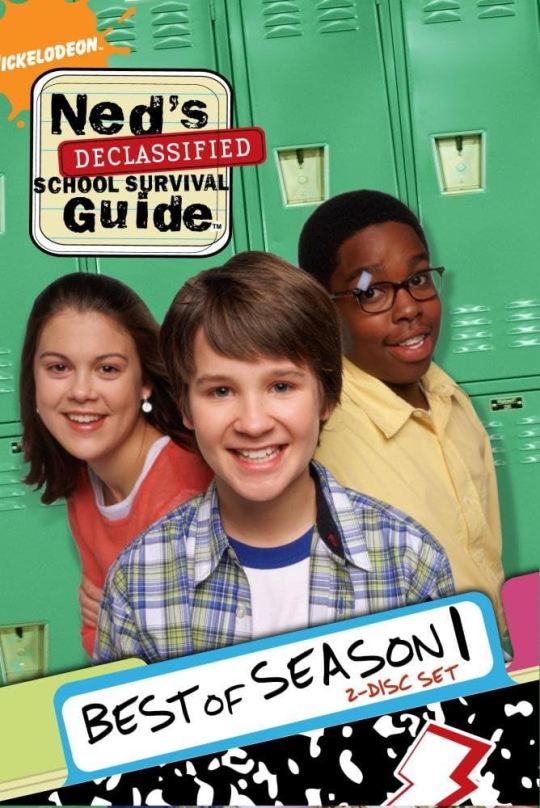
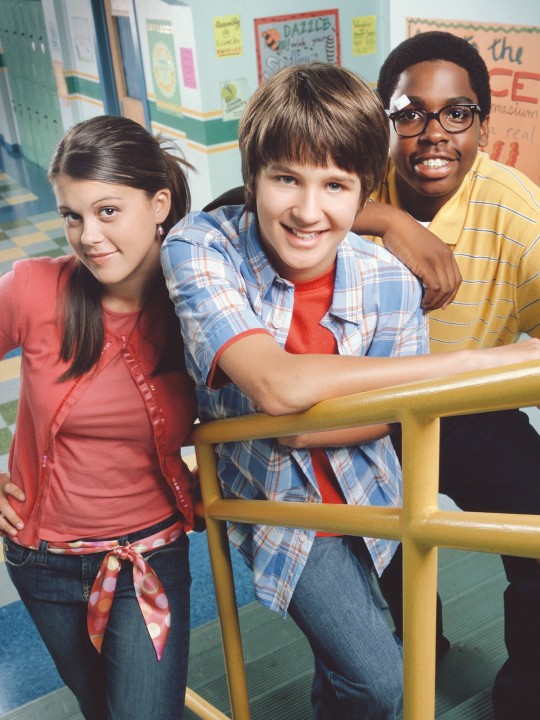



Gregory and Cassie would dress like Ned Bigby and Mabel Pines
#gregory gives off such dipper in sock opera vibes#not even the reverend suit the scene where hes on the roof witj the laptop and hes wearing the navy jacket#that one#pandas.txt#pandas talks#gregory#cassie#fnaf gregory#fnaf cassie#thoughts
263 notes
·
View notes
Note
"I have the sudden urge to draw Basil from hit game OMORI. Please send requests……."
Sunny standing between (real world)Basil and Stranger at the same time.
Both of them are jealous of each other, thinking about how they could one-up the other as Sunny's best friend.
Adding the request @mikkokomori made on discord as well ^^

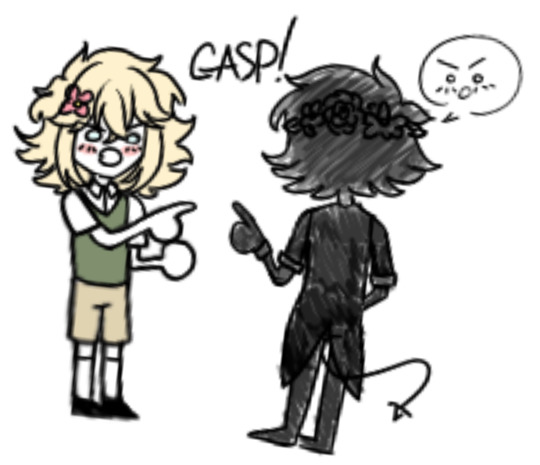
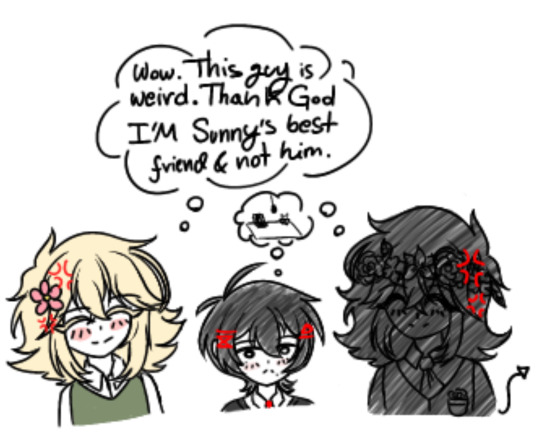
They hate each other!
49 notes
·
View notes
Text
Remember a little while ago when I "proved" I wasn't dead? 😅😅😅
Well, I didn't die, but I got an insane flu at the end of January and was sick for like three weeks and was not able to have any presence in any social media... I just laid in bed, watching cartoons on my computer.
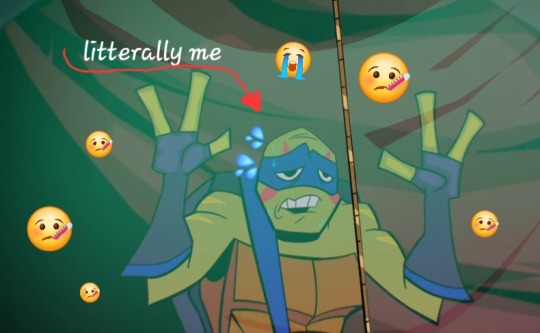
The floor was indeed made of lava...
I had the most sore throat ever, and even after my fever was gone, I kept coughing like crazy.
It was pretty horrible.
I wish had a stage 6 like rat-flu, because I could neither write or read any fan fiction, so now I'm even more behind with reading fanfics as well as writing more than I already was before I got sick. 😆

So that's why I have shown absolutely no presence in over a month. Even after I got better, I had a lot of things to catch up on, so I still couldn't find the time for writing until last week.
BUT with that said, my Yan!Donnie oneshot is almost finished and will be posted either tomorrow or the day after, so please look forward to it. 💜
(And mayyyybe I will soon be able to finally continue writing TKTM)
7 notes
·
View notes
Note
omg fellow it/its user!!! (insert a picture of a blushy cat or smth here i dont have any images)

INDEED, it is I, the Navi! I am but a critter who gained access to the internet !!!
3 notes
·
View notes
Text
ugh something i did not consider was having to update my algorithm on here. as much as i shit on echo chambers, it's actually exactly what i'm looking for with mindless scrolling
0 notes
Text
i appreciate top gun cuz in the pattern of legacy movies (logan, craigbond, and endgame) they all give the main character a cute little girl as their kid but then tom cruise was like this is a grownass man, a 30 year old man, and thats his little boy
#top gun maverick#bradley rooster bradshaw#pete maverick mitchell#like i think its just nice cuz these movies are like Male Power Fantasy Join the Navy Wear Cool Sunglasses#but then they were like 'the heart of this film is this guy who really wants his son talk to him again' and its different its nice#blu posts#also in the pattern of these movies he shouldve died but he refused to do that too so power moves all around from mr cruise
1K notes
·
View notes
Text

oh the dread, oh the worry! you love your sister so much and you need to know shes okay. you trust her but you cant trust the world, and more than anything else you cant trust yourself
#jrwi riptide#jrwi fanart#jrwi riptide spoilers#jrwi show#gillion tidestrider#edyn tidestrider#RAHHH IVE HAD THIS ROTTIN IN DRAFTS FOR A BIT but im finally here n ready to POST!!!!#SO THE LIL GILLION AND EDYN ARC HUH??#gillion as a character makes me so emotional. he means so well yet sucks so bad in every way he wish he didnt#HE CARES SOO MUCH ABOUT HIS SISTER. MAN HAS NEVER CRIED EXCEPT FOR THE DAY HE SAW HER AGAIN#HE WAS SOOO HAPPY TO SEE HER AND FIND OUT SHES OKAY. I ALSO REMEMBER SCREAAAAMIN WHEN SHE FIRST APPEARED#I HAD BEEN THINKIN ABOUT EDYN FOR SO LONG... ohhh older sisters where u at... u understand... only us older sisters get it#andNOW WHERE IS SHE..? WHERE IS SHE NOW.... working with the navy to 'undo' what the undersea has done to her precious baby brother#OKAY ENOUGH EMOTIONS TIME FOR ME TO TALK ABT MY ART#REAAALLY THIS IS ONE OF MY BEST DOODLE PAGES SO FAR. IM SO PROUDA THE COLORS N THE SCENES AND THE EMOTIONS#the lil scene with edyn comforting gillion after 'a day of alot of failure. that was the first we ever saw of edyn right? i love my colors#A MIRROR! edyn painted in red when shes often blue. framed by rock and coral and memory sharing bracelets and fire.#A MEMORY! a recent event! finding her at the bar and meeting her at a tavern. its cathartic to hear your older sister tell you its okay#even more cathartic to have her remind you that you are not your tragedies. you were just a kid. you didnt deserve what happened.#you really missed having her here#OH BUT THE NEXT. A NOTE LEFT BEHIND. NOTHING ELSE. i love you a million gillion#BUT THATS NOT A REASSURANCE IS IT? its a trust fall. emphasis on the fall. emphasis on the needle in your chest as wind rushes past#you anticipate the ground but you wish you could anticipate her arms. you wish you could trust. you need to trust. so why cant you?#instead you lash out. again. just like last time. just like always. you were never good at controlling your emotions#all you do in the end is break stuff. none of them can trust you. thats why she cant tell you. thats why he didnt tell you. noone trusts yo#chips got way too many damn belts btw. put some o those back boy u do NOT need all that mess jingling around ur gay hips. you FRUIT!!!!!!!!#I liked the scene with jay n chip dragging gillion around. its a comical scene ofc and i LOVE that balance here. but that sadness remains.#they care about gillion so much..... auuwuuuu.....#OKAY FINAL THOUGHTS. I RLY LIKE DRAWING DIFFERENT TEARS FOR DIFFERENT TYPES OF CRYING#when the tears well up so big from uncontainable joy that you cant even see
202 notes
·
View notes
Text
I dont think anyone talks enough about jay being an angry crier, a frustrated crier, who cries so easily but never once is she put down for it or is it phrased against her as weakness. She’s a baddass motherfucker with a gun and is a genius inventor and she probably cries when she can’t understand why her project Won’t Work and she’s been on the same issue for an hour now
And it might be poor memory but I can’t remember a time that gil or Chip told her not to cry, like sure they always try to make her feel better, but they never try to make her stop before she’s ready. It makes me wonder how often she was told to stop crying as a child. and if she couldn’t make it happen she’d get frustrated with herself for not being able to stop which just made the crying worse
Like she’s so emotional. She’s incredibly, visibly, emotional. and not only is she never narratively punished for it, I feel like it’s also honored as something important and one of her strengths. At this point in the campaign, whether or not jay is (genuinely, not bit mode)upset becomes a deciding factor on if the boys go through with a bad plan. And how her being emotional and vulnerable has made her bonds with chip and gillion so much stronger that they ask her to talk to the other about problems
Yeah I have no proper conclusion but jay being an easy crier is in fact one of her girl boss qualities💪🏻💪🏻💪🏻
#just literally thinking about how she hasn’t ended up crying after talking to her navy family members#*not crying#jay ferin the world#jrwi#jrwi riptide#just roll with it#jay ferin
322 notes
·
View notes